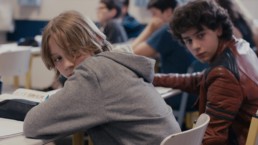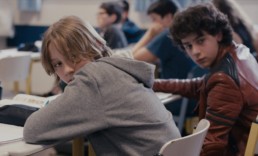Gondry’s Playful ‘Microbe and Gasoline’ Gets Existential With Adolescence
Gondry's love letter to childhood.
In his latest scaled-down effort, the ever-imaginative Michel Gondry infuses his childlike curiosities with his DIY art production in this story about boyhood friendship.
There’s a thing about movies dealing with adolescence which becomes even truer when that movie is made from the point of view and from the voice of an adolescent: it takes a person who is still connected to that time in childhood that captures the teetering naivete and tottering maturity. Michel Gondry, director of such visually wonderful films as “Eternal Sunshine of the Spotless Mind” and “The Science of Sleep” is one of those directors that can write such characters and get such candidly authentic performances, which is seen here in his latest movie.
“Microbe and Gasoline,” Gondry’s latest small-scale effort, is a movie about Gondry’s childhood selves, arguably. Thoughtful and quiet artist Daniel (Ange Dargent), hunches over his sketches of punk rock friends and is consumed by such age-appropriate matters as sex and death. He catches the attention of a few girls in class with his write-up about his punk rocker painting art show, but is all-the-same dismissed by the rest of the kids for his smallish build, landing the nick-name “Microbe.”
Enter the new kid in school – Théo (Théophile Baquet), or “Gasoline” as he is soon called, for the smell of gas from his motor scooter (assembled from his dad’s antique shop – a great excuse for Gondry to feature practical effects). Both recognizing the other as individuals in a sea of monotony, they soon find a kinship and bond over the things that completes the other: Daniel’s a little less self-assured than the goofier outsider Théo, and also draws pictures of punk rockers while Théo asserts himself as a punk rocker in real life. Daniel complains that his mother loves him too much, Théo complains that his mother doesn’t love him enough. Daniel romanticizes his own emotional pangs because he comes from a strong family unit, while Théo shrugs off pain, arguably because of his own fractured family life. And so, Microbe and Gasoline’s ideas take them everywhere, leading them both to ponder freedom – which takes the form of assembling a type of playhouse/car (a garden shed with wheels and a motor) to road trip through France.
“Microbe and Gasoline” covers a range of genres, working as a buddy movie, road movie, and collective coming-of-age movie. But it’s also effortless and airless as a movie that’s simply about the pleasures of friendship and connection and voicing and discovering affirmations about adult living that they are embarking on. If “Microbe and Gasoline” comes up short in any department, it might be that it’s just a little too timid for its own good, and doesn’t broaden itself out to make any larger statement about anything other than youthful angst. In less inspired writing, the “dumb jocks” are literally the villains here (Gondry doesn’t miss the opportunity to have Théo asset that “today’s bullies are tomorrow’s victims”). In the film’s latter part, which feels about twenty minutes too long, Gondry ends up casting out final lines of half-baked philosophical threads, which ultimately weigh the film down and make the audience lose sight of the magic that first made them friends.
“Microbe and Gasoline” is essentially Gondry’s love letter to childhood and life, and maybe one of his most personal movies yet.
“Microbe and Gasoline” is rated R for some sex-related material involving young teens. 105 min. Now playing.
Ryan Rojas
Ryan is the editorial manager of Cinemacy, which he co-runs with his older sister, Morgan. Ryan is a member of the Hollywood Critics Association. Ryan's favorite films include 2001: A Space Odyssey, The Social Network, and The Master.


